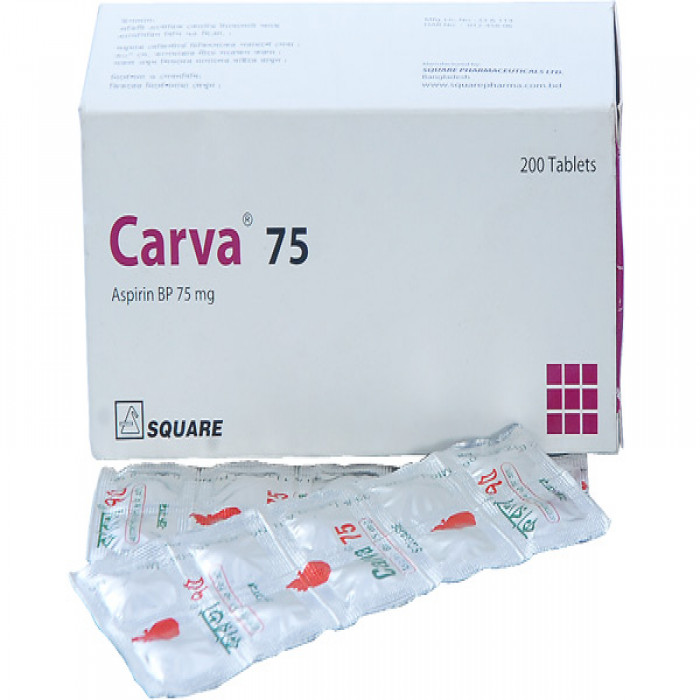
✔ 100% Authentic Product
👁️ Currently Viewing 4467
Aspirin 300mg Tablet 10pcs
Aspirin prevents the formation of blood clots in the body and reduces the risk of its associated conditions (like heart attack or stroke)
Discount
Price: ৳ 21
MRP:
৳
22
5%
Off
✅ Description:
Aspirin belongs to the class of anti-inflammatory and blood-thinning/antiplatelet agents. Its use varies according to its strength. In low doses (about 75 mg), it acts as a blood-thinning or antiplatelet agent to prevent heart attack and stroke. In high doses (about 325 mg), it acts as an analgesic, relieving minor aches, pains, and fevers. It may also be prescribed immediately after a heart attack to prevent further clots and heart tissue death.
Aspirin 300 plays a vital role in thinning the blood by its antiplatelet activity, decreasing the risk of blood clot formation and subsequent heart attack. It makes the blood less sticky, preventing the risk of heart attack and stroke. Additionally, it inhibits the activity of cyclooxygenase (COX) and prostaglandins (PGs) that cause inflammation, swelling, pain, and fever.
Aspirin 300 can be taken with or without food and swallowed whole with a glass of water. It should not be chewed, bitten, or broken. Your doctor will advise the dosage frequency based on your medical condition. ASPIRIN can be administered orally or rectally.
Avoid drinking alcohol, taking painkillers (ibuprofen, ketorolac), or the abortion pill (mifepristone) with Aspirin, as it can increase the risk of stomach or gastric bleeding. Aspirin should not be given to children with flu, fever, or chickenpox unless prescribed by a doctor due to the risk of Reye's syndrome. Avoid using Aspirin during the last trimester of pregnancy and while breastfeeding due to possible harm to the unborn baby and nursing infant, respectively.
Safety Advices

Alcohol
UNSAFE
Unsafe to consume alcohol while taking Aspirin 300 due to the increased risk of stomach bleeding.

Pregnancy
CONSULT YOUR DOCTOR
Generally unsafe during pregnancy, especially in the third trimester, unless the benefits outweigh the risks. Consult your doctor before use.

Breastfeeding
CONSULT YOUR DOCTOR
Probably unsafe during breastfeeding as limited data suggests it may pass into breast milk and harm the baby. Consult your doctor.

Driving
CAUTION
May decrease alertness, affect vision, or cause drowsiness and dizziness. Avoid driving or operating machinery if experiencing these symptoms.

Kidney
CONSULT YOUR DOCTOR
Use with caution in patients with kidney disease. Dose adjustment may be necessary. Not recommended in severe kidney disease.

Liver
CONSULT YOUR DOCTOR
Use with caution in patients with liver disease. Dose adjustment may be necessary. Not recommended in severe liver disease.
✔️ Composition
Aspirin
✔️ Uses of Aspirin 300
- Prevention and treatment of heart attack, stroke, and angina.
- Mild to moderate pain relief and fever reduction.
✔️ Side Effects of Aspirin 300
Common side effects include heartburn, increased bleeding tendency, nausea, upset stomach, and vomiting.
✔️ How does Aspirin 300 work?
Aspirin 300 is a non-steroidal anti-inflammatory drug (NSAID) with antiplatelet action. It prevents platelets from sticking together, reducing the formation of blood clots and lowering the risk of heart attack or stroke.
✔️ Quick Suggestions:
- Helps prevent future heart attacks and clot-related strokes.
- Generally well-tolerated with minimal side effects.
- Use with caution in patients with kidney or liver disease.
- Inform your doctor if you experience unusual bleeding, ringing in the ears, or persistent nausea or vomiting.
✔️ Indication of Aspirin 300
Aspirin 300 is an antiplatelet medication primarily used to treat and prevent heart attacks, strokes, and angina (heart-related chest pain). It works by inhibiting the formation of blood clots in the blood vessels, thereby reducing the risk of thrombotic events.
✔️ Pharmacology
Asprin 300 mg works by decreasing platelet aggregation, thereby inhibiting thrombus formation primarily on the arterial side of circulation. Thrombi are formed by platelet aggregation, and anticoagulants have limited effect in this area. It serves as the analgesic of choice for various conditions including headache, transient musculoskeletal pain, and dysmenorrhea. Additionally, Disprin 300 mg possesses anti-inflammatory and antipyretic properties, which can be beneficial. The enteric coating of the tablets reduces the risk of intestinal disturbance and gastrointestinal ulceration associated with this medicine.
✔️ Dosage & Administration of Aspirin 300
Aspirin 300 mg Dosage Guidelines:
Pain, Inflammatory Diseases, and Antipyretic:
- Initial Dose: Disprin 300 mg - 300 mg
- Frequency: 1-3 tablets every 6 hours
- Maximum Daily Dose: 4 g
Thrombotic Cerebrovascular or Cardiovascular Disease:
- Initial Dose: Disprin 300 mg - 300 mg
- Frequency: 1 tablet daily
- OR Initial Dose: Disprin 300 mg - 75 mg
- Frequency: 4 tablets daily
After Myocardial Infarction:
- Initial Dose: Disprin 300 mg - 75 mg
- Frequency: 2 tablets daily for 1 month
Following Bypass Surgery:
- Initial Dose: Disprin 300 mg - 75 mg
- Frequency: 1 tablet daily
Take the medication as prescribed by your doctor, usually with food to minimize stomach upset. Swallow the tablet whole; do not chew, crush, or break it.
✔️ Interaction
Drug-Drug Interactions with Aspirin:
- Blood thinners: Interaction with drugs like warfarin, heparin, phenindione, and clopidogrel may increase the risk of bleeding.
- Immune-related drugs: Drugs such as cyclosporin and tacrolimus may interact with aspirin.
- High blood pressure pills: Captopril and metoprolol may interact with aspirin.
- Heart disease-related pills: Interaction with acetazolamide and digoxin is possible.
- Antidepressants: Fluoxetine, sertraline, and lithium may interact with aspirin.
- Painkillers: Ketorolac, naproxen, and ibuprofen may have interactions with aspirin.
- Steroids: Interaction potential exists between aspirin and steroids.
- Gout drug: Aspirin may interact with probenecid.
- Anti-epilepsy drug: Interaction with valproate and phenytoin is possible.
- Anti-cancer or anti-arthritis drug: Methotrexate may interact with aspirin.
- Anti-diabetic pills: Interaction potential exists with glibenclamide.
- Abortion pill: Interaction with mifepristone.
- Osteoporosis-related drug: Interaction potential with oral alendronate.
Drug-Food Interactions with Aspirin: Taking aspirin along with alcohol, caffeine, and herbal supplements like ginkgo biloba can affect its efficacy and may potentiate its side effects.
Drug-Disease Interactions with Aspirin:
- Blood clotting disorder: Aspirin is not recommended for people with haemophilia, bleeding disorders, von Willebrand's disease, or telangiectasia as it may increase the risk of bleeding.
- Asthma: Individuals with asthma should use aspirin cautiously due to the risk of exacerbating asthma symptoms.
- Liver/kidney problem: Aspirin should be used with caution in individuals with liver or kidney problems.
- Stomach or intestinal ulcer: Aspirin can exacerbate stomach or intestinal ulcers.
- Severe heart problems: Aspirin may worsen conditions causing shortness of breath.
✔️ Contraindications
It should be administered cautiously in cases of asthma, uncontrolled blood pressure, and during pregnancy. It should be administered with caution to patients with nasal polyps and nasal allergies.
✔️ Pregnancy & Lactation
It is especially important to avoid using Assprin 300 mg during the final three months of pregnancy unless explicitly instructed by a physician, as it may lead to issues in the unborn child or complications during delivery.
Additionally, Asprin 300 mg can enter breast milk, so it should be administered cautiously to nursing mothers.
✔️ Precaution & Warnings:
- You should avoid drinking alcohol and taking painkillers like ibuprofen, naproxen, or ketorolac, along with Aspirin 300. Concurrent intake can increase the risk of gastric bleeding and reduce the effectiveness of Aspirin 300 in preventing heart attacks and strokes. Additionally, the abortion pill mifepristone should not be taken with Aspirin 300.
- Aspirin 300 should not be administered to children with flu, fever, or chickenpox unless prescribed by a doctor, as it may increase the risk of Reye's syndrome, a rare but serious condition involving swelling in the brain and liver.
- During the last trimester of pregnancy, Aspirin 300 should be avoided due to potential harm to the unborn baby. It can also pass into breast milk and may harm the nursing infant, so it's important to inform your doctor if you are pregnant, planning to become pregnant, or breastfeeding before taking Aspirin 300.
- Aspirin 300 may increase the risk of gastrointestinal bleeding, intracranial bleeding, or bleeding in other areas of the body. It may also interfere with laboratory tests, such as urine sugar tests, potentially causing false results. Make sure to inform laboratory personnel and doctors that you are taking ASPIRIN.
- Before taking Aspirin 300, inform your doctor if you have a stomach ulcer, bleeding disorder, low vitamin K levels, aspirin-induced asthma, allergies to ASPIRIN or other painkillers, kidney disease, liver disease, diabetes, or if you are planning to undergo any type of surgery.
✔️ Storage Conditions:
- Keep Aspirin 300 Tablet out of reach of children
- Store at room temperature
⚠️Disclaimer:
At ePharma, we’re committed to providing accurate and accessible health information. However, all content is intended for informational purposes only and should not replace medical advice from a qualified physician. Please consult your healthcare provider for personalized guidance. We aim to support, not substitute, the doctor-patient relationship.












